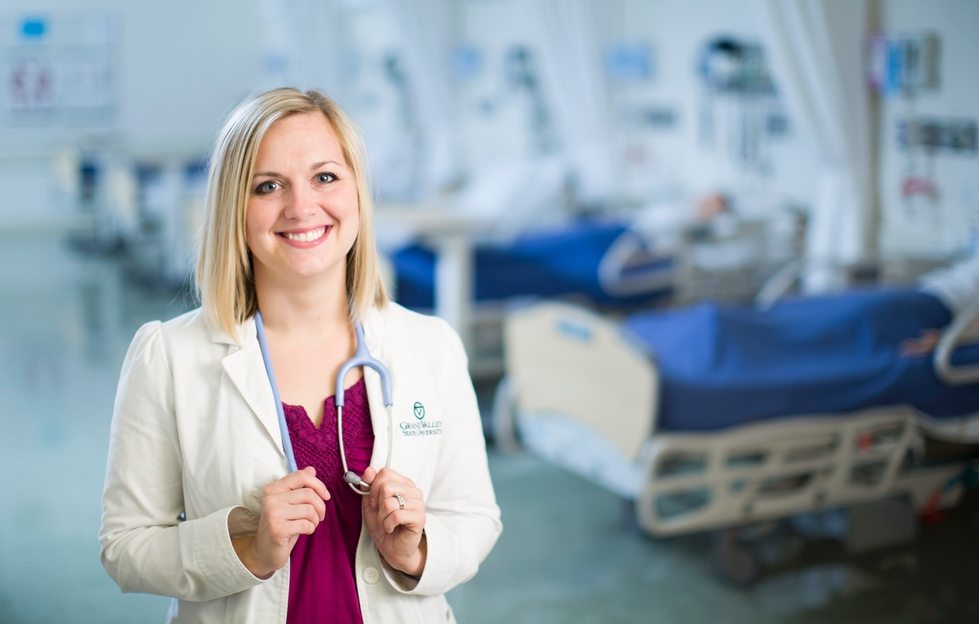Mastering a subject
Growing graduate studies
by Leah Twilley
Talented faculty, motivated students, first-rate facilities, technology and community partners are all part of a very important mix.
They are what make a Grand Valley graduate program successful, said Jeffrey Potteiger, dean of Graduate Studies. They also play a role in determining potential for new programs.
This combination has proven successful since the first graduate program was established in 1973, the master’s of business administration. Fast forward 42 years to 2015 when 36 programs that span all eight colleges serve more than 3,500 students.
In the early 1970s it was determined by the leaders of Grand Valley that the university needed to offer graduate programs to become a well-rounded, comprehensive university. As Grand Valley grew over the years, so did the number of graduate programs.
And it’s still growing. Within the last two years, graduate programs in applied linguistics, clinical dietetics, and philanthropy and nonprofit leadership were established. In 2008, Grand Valley became the first university in the region to offer a doctoral program in nursing practice.
Potteiger said graduate opportunities in the nursing and health professions will continue to grow. “With the Medical Mile in Grand Rapids developing as it is, Grand Valley has been afforded opportunities to develop programs that fit nicely with needs of the community and nation,” he said.
The decision to develop a new program is based on a variety of factors that address local, statewide and national needs. Potteiger and his staff pay close attention to job markets and opportunities, as well as competition and the necessary resources and expertise needed for a new program.
“It’s also very important to consider how long it will take a student to complete the program, how much it will cost, and if the other 16 colleges and universities in the area offer it,” he said.
Delivery is important, too. Potteiger believes certain types of courses can be delivered effectively in an online or hybrid environment, but the university must consider how graduate students learn best.

Rahat Sultana
photo by Mitch Ranger
“Some students are digital natives and would enjoy an online course and some aren’t as comfortable using technology, so an in-person, face-to-face format is best,” he said. “At the end of the day, we must deliver effective instruction that will put students in a position to be successful. And that’s key.”
Rahat Sultana, master's of science in engineering
Rahat Sultana’s goal is to become a teacher. But first she said she must complete her master’s degree, and eventually, receive a doctorate.
Originally from Kushtia, Bangladesh, Sultana specializes in product design and manufacturing engineering. She received her undergraduate degree from the Bangladesh University of Engineering and Technology and completed her first year at Grand Valley in April 2015, along with her husband, who is also an engineering graduate student.
She said getting a master’s degree was an obvious step. “I want to make sure I have a deep understanding and knowledge of the subject I will teach, which is why I came to Grand Valley,” Sultana said.
Since she was 6 years old, Sultana knew she would pursue engineering. “My father is an engineer. He has a workshop and when I was little I helped him design and build things,” she said.
“I knew that I wanted to be an engineer, but really, I just wanted to be like him. He always encourages me to do my best.”
As a graduate assistant in the School of Engineering, Sultana researches ways companies can optimize their manufacturing processes and workflows. She observes current manufacturing processes and helps companies better arm their engineers with ways to improve and streamline their processes with machines and on the production floor.
Access to resources and labs, helpful faculty, and strong course curriculum are what she enjoys most about Grand Valley.
She has also found a piece of home in Grand Rapids. “In Bangladesh, I would have to cross a bridge to get to school, so when I cross the blue bridge here, it feels like I’m coming home,” she said.
Mario Adkins, master's of education
Mario Adkins’ love of higher education is twofold.
As an undergraduate, then graduate student in the College Student Affairs Leadership Program at Grand Valley, Adkins said he not only learned hard skills in the classroom, but also soft skills outside of the classroom, which are just as important.
“Student affairs is really the outlet that teaches those soft skills, like professionalism and patience,” he said. “It looks at students holistically.”
He discovered his passion for student affairs through experiences before and during his time at Grand Valley.

Mario Adkins
photo by Elizabeth Lienau
“I was homeschooled from sixth through 12th grade, so when it came time to choose a college, I couldn’t go off to a four-year, live-on-campus institution, I wasn’t ready for that,” said Adkins, who graduated in April with a master’s degree.
He attended Grand Rapids Community College for two years, which helped him adjust to a college atmosphere, then transferred to Grand Valley, where he became a resident assistant and was inducted into Omicron Delta Kappa National Leadership Society. He currently sits on the ODK national advisory board.
Adkins said getting a master’s degree was a natural next step. “I want to put things in place that can make me the best person I can be,” he said.
His experiences in the CSAL program, which is celebrating 20 years, helped him become a well-rounded professional.
He served as a research analyst and graduate assistant in the College of Education where he studied higher education administration and conducted research on K-6 co-teaching instruction. He also worked at Rensselaer Polytechnic Institute in New York for a summer and studied abroad in El Salvador.
“If there’s one thing I love, it’s teaching,” Adkins said. “You get to impact students in so many different ways. At the end of the day it’s not about the paycheck, it’s about impacting students’ lives. That’s satisfaction enough for me.”
Jennifer Zachary, doctorate of nursing practice
Army Reserve veteran Jennifer Zachary was three semesters away from receiving an undergraduate degree in nursing from Western Michigan University when she was deployed to Iraq.
For eight years, she served in the military as a police officer and combat support unit member. Upon her return, she completed her nursing degree and decided to further her education by enrolling in Grand Valley’s four-year doctoral nursing practice program.
Zachary, a part-time nurse at Borgess Medical Center in Kalamazoo, said she chose Grand Valley because of its reputation and program layout.

Jennifer Zachary
photo by Elizabeth Lienau
“The hybrid format gives me both independence and guidance. It’s a nice mix of both online and in-person course instruction,” she said, “plus it’s helpful that the building is located on the Medical Mile.”
Her 5-year-old daughter, whom Zachary adopted during her first semester at Grand Valley in 2012, has been the inspiration for her research that focuses on the effects of alcohol on pregnancy. McKenzie, born in 2010, has fetal alcohol syndrome.
“There’s a lot of research that says heavy alcohol consumption definitely leads to FAS,” Zachary said, “but more and more research is coming out that says small amounts, like a glass of wine a few nights a week, do have effects, like neuro-behavioral problems and disorders.”
On track to graduate in April 2016, Zachary will continue her research and is completing clinical experiences at Grand Rapids Women’s Health and Bronson Lakeview Family Care in Decatur.
Her dream job is to work in an environment where she can serve medically underserved people and specialize in women’s health.
National recognition and awards
• U.S. News and World Report (2015) ranked the business and nursing programs higher than all other graduate programs in West Michigan, and the physical therapy program ranked best in Michigan.
• The Educational Technology, M.Ed. program ranked among the top 100 online graduate programs by U.S. News and World Report.
• Education Portal ranked the biostatistics program among the top 10 national biostatistics programs.
• MBA Healthcare Management ranked the medical and bioinformatics program in the top 25 master’s in health care informatics degrees.
